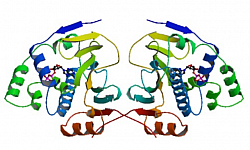Sussex enters science festival with a pop, a fizz and a bang
The University of Sussex will once again be joining the Brighton Science Festival, now in its eighth year, with a series of lectures, talks and hands-on demonstrations.

 Students and academics from all over the University including Informatics, Psychology, BSMS, Education, Biology, Biochemistry and the Genome Damage and Stability Centre, will be sharing their knowledge and expertise at events throughout the Brighton Science Festival.
Students and academics from all over the University including Informatics, Psychology, BSMS, Education, Biology, Biochemistry and the Genome Damage and Stability Centre, will be sharing their knowledge and expertise at events throughout the Brighton Science Festival.
This year the University’s contribution to the festival kicks off on ‘Bright Sparks’ weekend, two days of science fun aimed at 7 – 14 year olds during the first weekend of half term (Hove Park Upper School, 10am - 5pm, Saturday 15 – Sunday 16 February). Trainee science teachers from the University’s Department of Education will be showing participants how to create interactive models using new methods of teaching and learning in ‘Teach the Teachers!’ Later, medical students from the Brighton & Sussex Medical School will be taking volunteers on a tour of the human body in ‘Explore the Body’.
On Sunday at ‘Bright Sparks’, Professor Alison Sinclair from the Biochemistry department will host ‘DNA Detectives’, an exploration of the genetic code. Participants will be able to marvel at the beauty of proteins and have a chance to take part in an experiment. Researchers from the Genome Damage and Stability Centre will be on hand to show how viruses kidnap DNA in ‘DNA Repair’.
The following week, the science festival will borrow Falmer Bar for an evening of ‘Speed Mating’ (7pm, Wednesday 19 February), a lively scientific experiment which will use new technology to measure how people get along.
The next day, speakers will talk about subjects close to their hearts, not too far from the bar in ‘The Catalyst Club’ (The Latest Music Bar, 8pm, Thursday 20 February). Professor Erik Millstone (SPRU) will explain how paradoxically our use of sweeteners could be increasing out addiction to sugar in ‘The ‘benefits and ‘risks’ of using artificial sweeteners’. Later, Professor Anil Seth (Sackler Centre for Consciousness Science) will explain how our morals and friendly behaviour are all in the brain in his talk ‘The moral molecule.’
What comes next for mankind? In ‘The Future of Us’ scientists from the University of Sussex will talk about the fusion between man and computer. Speakers will include Dr Blay Whitby, Visiting Lecturer (Centre for Cognitive Science) who will discuss the possibility and/or absurdity of achieving immortality ‘in silico’ (as a computer program) via an uploading of consciousness. Professor Anil Seth (Sackler Centre for Consciousness Science) will talk about the prospect of enhancing the brain’s cognitive ability through technologies such as transcranial brain stimulation (Friends Meeting House, 7.30pm, Wednesday 26 February).
The ‘Eastbourne Sceptics’ talk will be held by Lecturer in Education, James Williams, who will talk about the man who lived in Charles Darwin’s shadow, Alfred Russel Wallace, in ‘A life, a love of science and the mysterious missing ‘L’’(Bibendum, Eastbourne, 8pm, Wednesday 26 February).
‘All of the fun of the unfair’ is a day dedicated to examining fairness in all its forms. Psychologist Dr Alison Pike will examine the differential treatment of children by their parents and how fairness functions in the family in ‘The Obstacle Course: Negotiating childhood’. Then Dr Tom Farsides (Psychology) will look at the discriminatory, amoral and glorious world of love in his talk ‘The Tunnel of Love: All’s fair in love and war’ (Sallis Benney Theatre, 12.30 – 5.30pm, Sunday 2 March).
Brighton Science Festival holds events all over Brighton from Thursday 6 February to Sunday 2 March. The full listing of events and prices can be found on the Brighton Science Festival website.

